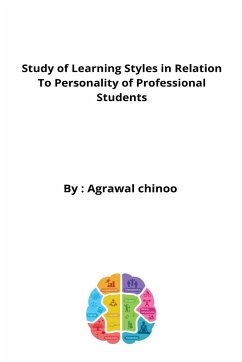INTRODUCTION The way in which this generation of students especially those pursuing professional courses like Medicine, Engineering and Management, learn is an important subject of study as the future of the nation depends on that. The traditional teaching- learning process in the country has favoured the theatrical styles of teaching where the teacher takes the centre stage and the student takes a back seat as a mere spectator (Nagaraj C, Pradeep B.S, 2011). This method has failed to produce effective professionals as the industry faces a shortage of highly skilled and trained manpower that is readily employable (Singh. C.D, 2008). It is increasingly becoming evident that a paradigm shift from ¿teacher-centred' to ¿student- centred' learning is heralded. ¿Student-centric' or ¿Learner-centric' learning is where the learner takes the centre stage and becomes the main character involved in the learning process (Hansen, 2000). Unless, the individuality of the learner is catered to, effective professionals may never be produced. Thus, the diversity in the classroom needs to be kept in mind with regards to the attitudes and orientations of the student which contribute the distinct personality of the student and the way in which he prefers to learn as a result of that. Thus whether the students pursuing professional courses have different types of personality and whether their personality influences their learning style is an interesting area to explore. People in general have always been fascinated by the concept of ¿typical differences' between people. People of different regions, cultures, or religions differ from each other in fundamental ways. People differ in their thoughts, in their feelings, in their wants and beliefs, and in what they say and do. Differences are all around and are not difficult to,
Bitte wählen Sie Ihr Anliegen aus.
Rechnungen
Retourenschein anfordern
Bestellstatus
Storno








